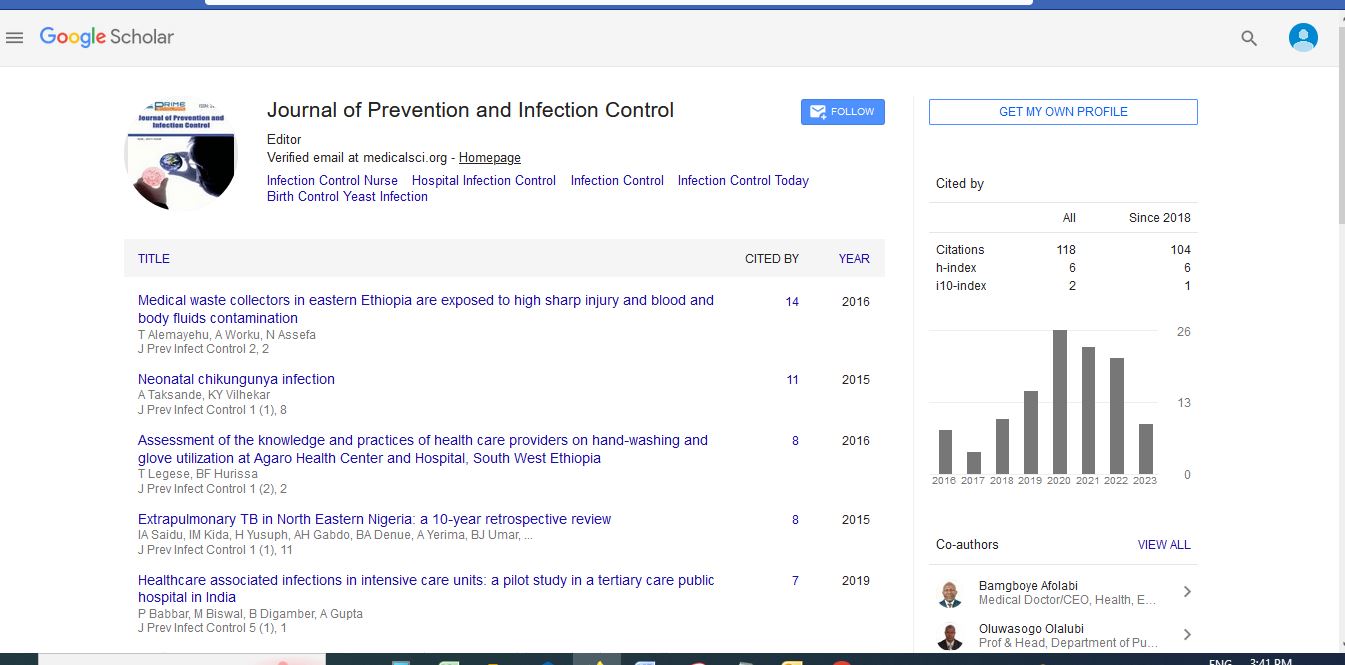Perspective - (2024) Volume 10, Issue 3
The Importance of Personal Hygiene: A Key to Health and Well-Being
Tao Jiang*
Department of Medical Science, Nanjing University, China
*Correspondence:
Tao Jiang,
Department of Medical Science, Nanjing University,
China,
Email:
Received: 02-Sep-2024, Manuscript No. IPJPIC-24-21352;
Editor assigned: 04-Sep-2024, Pre QC No. IPJPIC-24-21352 (PQ);
Reviewed: 18-Sep-2024, QC No. IPJPIC-24-21352;
Revised: 23-Sep-2024, Manuscript No. IPJPIC-24-21352 (R);
Published:
30-Sep-2024, DOI: 10.36648/2471-9668-10.3.27
Introduction
Personal hygiene is an essential component of a healthy lifestyle,
encompassing practices that maintain cleanliness and promote
overall well-being. While often overlooked, good personal
hygiene plays a significant role in preventing diseases, boosting
self-esteem, and enhancing social interactions. Understanding
and adopting effective personal hygiene practices can lead to
improved health and quality of life. One of the primary reasons
personal hygiene is crucial is its impact on health. Proper hygiene
practices reduce the risk of infections and illnesses. Regular
handwashing, for instance, is a simple yet effective method to
prevent the spread of germs and viruses. By washing hands
with soap and water, individuals can significantly lower the
risk of gastrointestinal and respiratory infections. Oral hygiene
is another vital aspect. Brushing teeth twice daily and flossing
regularly help prevent dental issues such as cavities, gum disease,
and bad breath. Maintaining oral health is not only important
for eating and speaking but also for overall health, as poor oral
hygiene can lead to more serious conditions like cardiovascular
disease.
Description
Personal hygiene also has a significant impact on mental and
emotional well-being. Maintaining a clean and well-groomed
appearance can boost self-esteem and confidence. People who
practice good personal hygiene are more likely to feel positive
about themselves and their interactions with others. Poor
hygiene can affect one’s social life and professional relationships,
leading to anxiety and depression. Regular grooming and
personal care routines help foster a sense of self-worth and
contribute to a more positive self-image. Good personal hygiene
is crucial for social and professional success. In both personal and
professional settings, maintaining cleanliness and a well-groomed
appearance demonstrates respect for oneself and others. It can
positively influence how one is perceived by colleagues, friends,
and potential employers. For social interactions, good hygiene
practices make it more enjoyable for others to engage with and
can improve social relationships. Establishing and maintaining
a daily hygiene routine is essential for overall well-being. Wash
hands regularly with soap and water, especially before eating or
after using the restroom. Shower or bathe regularly to keep the
skin clean and remove sweat and bacteria. The frequency may
vary based on personal activity levels and skin type. Brush teeth
at least twice daily and floss regularly. Regular dental check-ups
are also important for maintaining oral health. Shampoo and
condition hair regularly to keep it clean and healthy.
Conclusion
The frequency depends on hair type and personal preference.
Keep nails trimmed and clean to prevent infections and maintain
a neat appearance. Wear clean clothes daily and change them as
needed to ensure personal comfort and hygiene. Promoting good
personal hygiene starts with education and accessibility. Parents
and educators should teach children the importance of hygiene
from a young age, emphasizing habits like handwashing and
dental care. In public and workplace settings, providing facilities
and resources for personal hygiene, such as hand sanitizers and
clean restrooms, supports individuals in maintaining their hygiene
practices. In conclusion, personal hygiene is a fundamental aspect
of a healthy and fulfilling life. By adhering to regular hygiene
practices, individuals can enhance their health, self-esteem, and
social interactions. The benefits of good personal hygiene extend
beyond individual well-being, contributing to a more positive and
respectful community environment. Prioritizing personal hygiene
is not just about cleanliness but about fostering a better quality
of life for oneself and those around us.
Citation: Jiang T (2024) The Importance of Personal Hygiene: A Key to Health and Well-Being. J Prevent Infect Control. 10:27.
Copyright: © 2024 Jiang T. This is an open-access article distributed under the terms of the Creative Commons Attribution License, which permits unrestricted use, distribution, and reproduction in any medium, provided the original author and source are credited.

